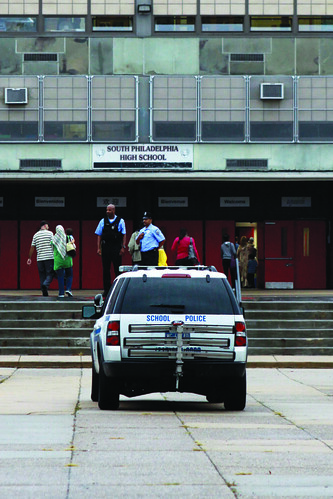School police officers are participating in a program to help them better understand childhood development.
Researchers from Temple are helping to create a training program for middle- and high-school police officers in Philadelphia to improve their understanding of childhood development.
“The purpose of the training school is to keep officers and students safe when interaction might have components of behavioral issues,” said Debbie Plotnick, the director of advocacy for the Mental Health Association of Southeastern Pennsylvania.

Plotnick, along with colleague Alyssa Goodin and Temple researcher Jennifer Wood, organized a five-day training session where school police officers were able to learn more about mental illness, domestic violence and intervention techniques.
“Students from urban areas are exposed to violence, domestic disputes and gangs, which influence their behavior,” Plotnick said. “It is important for police to understand that using force will spur the trauma from the child’s memory. Some students need to be counseled rather than arrested.”
In December 2009, Brenda Taylor, former deputy chief of Specialized Instructional Services for the School District of Philadelphia, hosted a meeting for school district officials to discuss ways to improve urban students’ mental health.
Goodin proposed a modification of the “Memphis Model” of crisis intervention team training, which aims to decrease the rate of injuries to officers and community members and to reduce unnecessary referrals of people in psychiatric crisises to the criminal justice system.
By applying the Memphis Model to school district police officers, the goal was to prevent troubled students from facing jail time and allow them beneficial treatment instead.
Thus, the “Climate Improvement” team training was spawned.
Sixteen school police officers met Sept. 1 to participate in seminars, lectures and discussions as well as interactive programs, such as role playing and student forums.
Topics that were discussed ranged from child welfare and juvenile justice to developmental disabilities and risk assessment with de-escalation, among other behavioral situations.
In addition to the staff, guest speakers, such as psychotropic medication representative Dr. Roomana Sheikh, depression and suicide for youth educator Dr. Marc Forman and the Crisis Response Center’s Angela Cantwell, were in attendance.
“It was a great group of officers who were all very engaged and excited about the program,” Goodin said. “They asked great questions and were very receptive to the information presented. The feedback that we received on the evaluations was above and beyond what we had hoped for.”
Research on the results has yet to be conducted. Wood said they plan to follow up with qualitative research to “assess knowledge and attitudes of trained versus non-trained officers to explore whether this training is having a lasting impact on officers’ thinking and practice.”
“It is our hope that there will be opportunities to expand this program and to engage in a more extensive evaluation of outcomes, pending needed research funding,” Wood said.
“We are hoping to expand the program as much as possible,” Goodin said. “We are currently working on solidifying dates for the second class of officers and are also continuing to monitor the effectiveness of the training so that we can revise it as necessary. We are currently focusing our efforts on expanding this training in the School District of Philadelphia, but we are considering that this training may be transferable to other youth serving officers in the future.”
Depending on the program’s success, there are plans to bring the training to campus police at Temple, the University of Pennsylvania and Drexel University.
John Corrigan can be reached at john.corrigan@temple.edu.


John Corrigan Thank you for taking the time to inform us. The information in this post I have found to be very useful and will bookmark your site to gather any further relevant content.